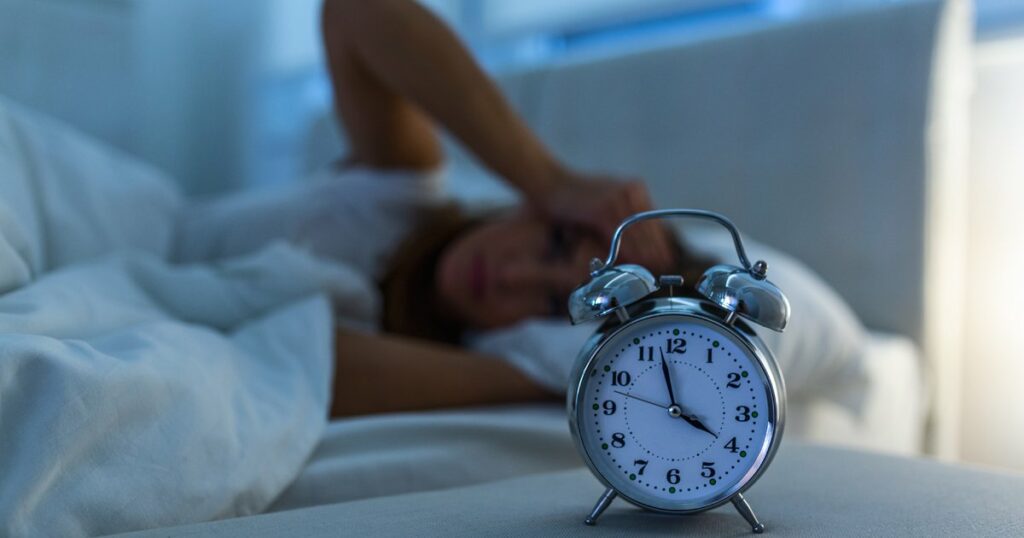Contents
What is Insomnia?
Insomnia is basically a sleeping disorder wherein you struggle with falling asleep. And even if you sleep, the disorder will not allow you to sleep for long hours. In shorter words, insomnia is both troubles in falling asleep or having uninterrupted sleep.
The condition might be acute or chronic. That is, insomnia might be short term or it can last for a longer time respectively. When a person suffers from acute insomnia he would suffer for at least one night to a few weeks. On the other hand, insomnia is considered chronic when it lasts for at least three nights a week for 3 months or even more.
Types of Insomnia
Mainly there are two types of insomnia namely primary and secondary.
Primary Insomnia: Insomnia is called primary when no other health issues are discovered in the patient’s body related to the sleeping disorder.
Secondary Insomnia: And it is considered secondary when the sleeping issues other disorders are occurring due to health issues such as depression, cancer, arthritis, asthma, or heartburn.
There are also some other types of insomnia that are listed below:
Sleep Maintenance Insomnia: This can be classified as too early to get up and too late to get back to sleep. When you face trouble staying asleep through the night and then waking up too early in the mornings.
Sleep Onset Insomnia: This is simply facing trouble are struggling to sleep
Mixed insomnia: You can call it a blend of sleep-onset insomnia and sleep maintenance. So what happens here is that you face trouble in both falling asleep and maintaining sleep all through the night.
Paradoxical insomnia: This is a condition of confusion and dilemma in relation to your sleeping hours. A person suffering from paradoxical insomnia usually underestimates. the time they are asleep. They feel like they have been sleeping a lot than they really do.
Causes of Insomnia
Causes of insomnia can be categorized under primary causes and secondary causes let’s discuss them one by one
Primary Causes of Insomnia
- Stress: You just cannot deny the power of stress. Stress-related to your personal and professional life is a very important role in your sleep, both in terms of quantity and quality. Some stressful life events such as death, illness of loved ones, joblessness, or relationship issues may lead to sleep insomnia. Depression and anxiety are some of the mental health issues that can cause insomnia
- Uncomfortable sleeping surroundings: If you come across noise light or a favorable temperature it is obvious that your sleep will be interrupted.
- Genes: Some families have the tendency of insomnia.
- Irregular sleeping habits: Poor sleeping habits and constant change in your sleep schedule can cause insomnia as well. Being on screens before bedtime, or taking naps during the day will disrupt your sleeping habits.
Secondary Causes of Insomnia
- Medications: There are some prescriptions given by doctors that cause hindrance in your sleep and also cause insomnia. These are basically the oct (over-the-counter) medicines. and they might include medication being taken for high blood pressure, asthma, depression, allergies, weight loss, or cold.
- Medical conditions: there are some conditions linked with insomnia including cancer, diabetes, heart disease, Alzheimer’s disease, overactive thyroid (hyperthyroidism), and Gastroesophageal Reflux Disease (GERD).
- Caffeine nicotine and alcohol: stimulants such as coffee tea cola and other caffeinated drinks hurdles your sleep. Having them in the afternoons or late in the evening can restrict you from sleeping at night. Nicotine in tobacco products is also a stimulant that disturbs slips. Alcohol does make you fall asleep but it prohibits deeper stages of it and usually makes you awake in the middle of the night.
- Sleep-related disorder: Some sleeping difficulties such as sleep apnea or restless legs syndrome affects your sleep. The latter is the condition wherein you might feel an unpleasant sensation in your legs restricting you to move your legs in the desired manner, hence preventing you from falling asleep.
Symptoms of Insomnia
The symptoms of insomnia are as follows:
- Dizziness and sleepiness during the day
- Restlessness and fatigue
- Difficulty falling asleep at night
- Facing interrupted sleep
- Waking up too early in the morning
- Irritability
- Depression and anxiety
- Increased chances of errors and accidents
- Grumpiness
- State of confusion
- Problems with memory and concentration
- Constant worries about sleep.
Insomnia and Age
Insomnia in Older People
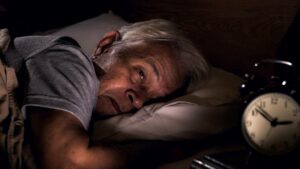
It has been found that insomnia becomes more prominent and common with age. As you age you experience:
- Alterations in sleeping patterns: You become more prone to your environment and other changes when it comes to your sleep; slightly unfavorable sleeping in Parliament or discomforts like noise or light will make you awake. It is said that as you age towards death the internal clock within you also advances. This is the reason why older people usually get tired earlier in the evenings and then wake up even earlier the next morning. This still needs the same amount of sleep as younger people do.
- Changes in activity: It is very natural that with age your physical and social activeness deteriorates. Since you have not been doing a lot of activity in the daytime, your good night’s sleep is interrupted. In addition to this, it has been seen that less activeness during the daytime will lead you to have more of a daily nap, again interfering with your sleep that night.
- Health changes: A lot of people in their old days faced a lot of health issues such as back problems, arthritis, depression, anxiety, and chronic pains in certain parts of their bodies. All these issues create a fuss in their sleep. Urination issues are one of the most common problems related to the prostate and bladder that disrupt sleep.
- More medications: As older people are more likely to fall ill, they are in more need of medications and drugs hence increasing the chances of insomnia associated with medications
Insomnia in Children

You must know that it’s not necessary that sleep problems only occur with older people and not with children and teenagers. It does occur and can be the cause of concern for children also. However, it is generally seen that children and teens face difficulty sleeping because of a regular bedtime. And this can also be the result of their delayed internal clocks.
Risk Factors of Insomnia
At some point or the other in life, every one of you must have gone through some occasional problems related to sleep. But you are seen at increased risks of insomnia due to the following reasons.
- Gender: Yes, if you are a woman you are at a higher risk of insomnia as compared to men. Reasons are the hormonal shifts during the menstrual cycle and menopause. Night sweats and hot flashes are very common during menopause and this disrupts your sleep.
- Age: When you cross 60 changes in sleep patterns and health and fast-moving internal clocks cause insomnia
- Mental or physical health condition: Many mental or physical issues related to health effects sleep.
- Irregular schedule: A lot of traveling changing shifts at the workplace affects your sleep-wake cycle.
Complications of Insomnia
Sleep is as important as food and water in your life. Whatever be the reason for your sleeplessness or sleep loss, insomnia is going to affect you both mentally and physically. People with insomnia suffer a lower quality of life as compared with people who have well-structured sleeping habits.
So the complications of insomnia can be:
- Lack of performance in the job or at school
- Not able to pay much attention when required for example while driving
- Depression anxiety disorders or substance abuse and other mental health disorders
- Higher risks and intensity of long-term diseases such as hypertension and cardiovascular diseases.
Insomnia Tests
If you want to know whether he was suffering from insomnia or not the only way is to visit the doctor. Initially, you can refer to the sometimes re-care doctor I tell you to visit some sleep specialist for further evaluation if need be.
There is no single test that can diagnose insomnia. However multiple questions and examinations can help your sleep specialist learn about what’s troubling you and keeping you awake.
How will a doctor examine Insomnia?
Before the next appointment, your doctor might ask you to maintain a sleep diary that can help him know how well or not you are sleeping or what things you do to make sleeping harder.
For 1 to 2 weeks you need to write down in your diary the following things:
- The timing of your going to bed and waking up
- How long does it take you to fall asleep
- Number of times you wake up every night
- What food and drink did you have before going to bed
- Do you sleep during the day? If yes, what is the number of naps you take during the day?
- Do you feel sleepy during daytime
- Do you and when do you exercise?
As per the readings of the above record and the doctor’s suspects, your doctor might ask you to have some tests such as:
Sleep Study
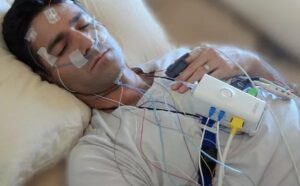
Also called the polysomnogram test, sleep study helps you to measure the ease you fall asleep with and how long you stay asleep. The test is also useful to learn whether someone has a sleep disorder such as restless legs syndrome, sleep apnea, or narcolepsy.
While the test is being performed you need to wear some sensors on your face, chest, arms, legs, and fingers and the doctors ask you to sleep up while the sensors will monitor you. The senses monitor you:
- Heart rate
- Breathing levels
- Oxygen levels
- Brain waves
- Muscle movements
Actigraphy
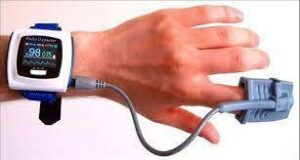
To measure how well you sleep this is another type of sleep test you do at home. What you do is a sensor on your back and ankle for a few weeks that helps you monitor when you sleep and when you wake up.
Blood Tests
To find out how to clear out the suspect the doctors will perform a blood test for thyroid disease, low vision levels, and other medical conditions causing sleep problems.
Treatment of Insomnia
When it comes to the treatment of insomnia it can be done by nonmedical therapy and medications as well. Some nonmedical therapy can include developing better sleep and a psychotherapy
Sleep Medications
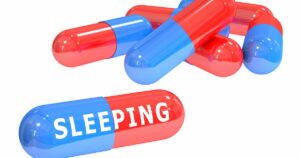
Some sleep-inducing drugs are:
- Benzodiazepine sedatives such as triazolam (Halcion), estazolam, lorazepam (Ativan), temazepam (Restoril), flurazepam, and quazepam (Doral).
- Non-benzodiazepine sedatives such as zolpidem (Ambien, Intermezzo), eszopiclone (Lunesta), and zaleplon (Sonata) are drugs that can help induce sleep.
The bad part about these medications is that if used extensively, they become addictions.
Plus, if you take these medications with any drugs that depress the central nervous system such as alcohol, they can be dangerous for you. But the side effects with non-benzodiazepine.
Some other medicines treating insomnia are:
- Belsomra
- Doxepin
- Antidepressant
- Ramelteon
Relaxation
- Many people suffering from sleeping difficulties just need a sufficient amount of relaxation. If stress is the cause of your sleeplessness, you must have a treatment for yourself.
- Some breathing exercises help you in relaxation:
- Complete exhaling from your mouth
- Inhale fully through your nose
- Hold your breath and count till seven
- Exhale from your mouth at eighth count
- Repeat the cycles three times.
Exercise
Exercise helps in what not. It helps in sleeping troubles as well. Some moderate or low-intensity exercises can help you sleep better and provide you with more energy when you are awake. Make a routine of doing exercise at least 3 to 4 times a week for 20- to 30 minutes. You should consult with your doctor for the type of exercise you need to do.
A Word From Mantra Care
Your mental health — your psychological, emotional, and social well-being — has an impact on every aspect of your life. Positive mental health essentially allows you to effectively deal with life’s everyday challenges.
For more information, please contact MantraCare. Sleep is an essential part of our daily routine and it plays a significant role in maintaining a healthy body and mind. If you have any queries regarding Online Insomnia Counseling experienced therapists at MantraCare can help: Book a trial therapy session
